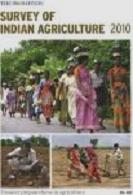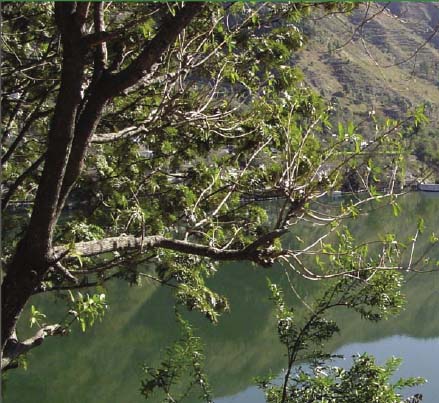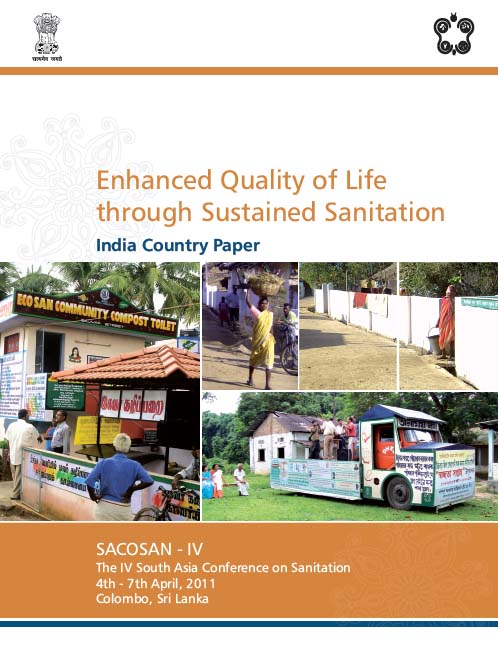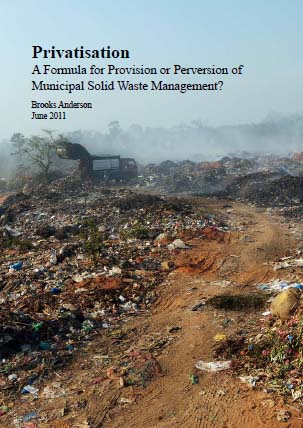/regions/india
India
Release of the latest issue of The Hindu's annual publication - Survey of Indian Agriculture 2010
Posted on 27 Jun, 2011 12:41 PM The survey aims to cover major crops and suggestions to farmers on how to take preventive steps to avoid yield loss. There will also be a special article on improvement in living conditions of the rural people.
The survey aims to cover major crops and suggestions to farmers on how to take preventive steps to avoid yield loss. There will also be a special article on improvement in living conditions of the rural people.
Contents
Section-1
Overview:
Enhancing the disaster resilience of agriculture
Prof. M.S. Swaminathan
Drought:
Preparedness to face drought challenges
Dr. V. Rajagopal
Intensive farming responsible for farmer suicides - Interview with Devinder Sharma with special focus on Odisha
Posted on 27 Jun, 2011 11:54 AM
Q: Odisha is not much known for farmers' suicide the way we hear it in Vidarbha, Andhra Pradesh etc. But of late such cases are being reported in the media. What's the reason?
A: When you look at the issue of farmers' suicide, it's an indication of the crisis that exists in the agriculture sector. This is linked to monoculture and intensive or industrial farming model that have been implemented in the country. Vidharbha for instance has been in the news on the issue of farmers' suicide mainly because there is one NGO namely Vidharbha Jan Andolan Samiti which regularly compiles the figures of farmers suicide and feeds to the media. Unfortunately there are no such NGOs elsewhere to do a similar job. So therefore we do not get the real picture of farmers distress in other areas where conditions are equally bad. If suppose this NGO also stops compiling suicide figures, our impression about Vidharbha as a suicide belt of India will also disappear. In other words, not only in Vidharbha, agriculture across the country is in a terrible crisis.
Sitaram Jindal Foundation invites nominations for Jindal prize 2011 – Apply by June 30, 2011
Posted on 27 Jun, 2011 11:31 AMThe Sitaram Jindal Foundation formerly known as S.J. Jindal Trust, set up in 1969 is a charitable organisation engaged in promoting education, healthcare & rural development. The foundation believes in serving humanity without consideration of caste, creed, religion or gender. It has no political, religious or commercial affiliation. The foundation has set up several schools, colleges, hospitals and has awarded scholarships to more than 1 lakh students.
Sir Dorabji Tata Trust and the Allied Trusts is looking for Program Associate at Mumbai – Apply by June 27, 2011
Posted on 27 Jun, 2011 11:16 AMEstablished in 1932, Sir Dorabji Tata Trust and the Allied Trusts, collectively form one of the largest private sector philanthropic organisations with an annual disbursement of Rs. 300+ crores. The Trusts offer individual assistance to students and to poor patients, make financial contributions to Institutions and provide financial support to over 600 NGOs in the country.
To administer their grant making and management activities, the Trusts are looking for a suitable professional for the position of Program Associate - Civil Society, Human Rights and Governance.
An Indian perspective on the conservation and management of lakes – A report by Ministry of Environment and Forests
Posted on 25 Jun, 2011 10:43 PM
This publication will serve to be useful reference material for policymakers, implementing agencies, environmentalists and those who enjoy the beauty and diversity of India’s water bodies.
Lakes are not only a source of water and livelihood for many of our populations, but they also support a large proportion of our biodiversity. The wetlands, shallower peripheral areas of large lakes, provide breeding and nesting grounds to huge population of birds, many of which migrate to India from as far north as Siberia.
Ashwas process handbook - A planning and execution guide for participatory surveys of household water and sanitation
Posted on 25 Jun, 2011 04:31 PMThe handbook was created as a result of several organisations expressing their interest in conducting an exercise similar to ASHWAS. The purpose of this handbook is thus to serve as a template for those wishing to carry out a similar effort in the other parts of the country.
Sanskriti Pratishthan invites entries for Prabha Dutt fellowship in Journalism
Posted on 25 Jun, 2011 01:51 PMSanskriti Pratishthan has established the coveted Sanskriti awards and fellowships for young talent in different fields.
The Prabha Dutt Fellowship in Journalism encourages young women who wish to investigate and research on any topic of contemporary relevance. This fellowship will be given every year. The fellow may work on a book or monograph for subsequent publication within the given time frame.
The purpose of the Fellowship is to encourage young mid career women journalists to develop their potential by pursuing meaningful projects without having to work under the pressures of short deadlines. The Fellowship carries a grant of Rs 1,00,000 including travel expenses.The work can be executed in Hindi, English or any regional language.
Assessment study of impact and sustainability of Nirmal Gram Puraskar – A report by CMS Environment
Posted on 24 Jun, 2011 11:02 PMNGP was initiated in Oct 2003 to encourage Panchayati Raj Institutions (PRIs), block and districts to take up sanitation promotion, a post achievement, award-cum-fiscal incentive scheme. The eligibility criteria for the PRIs to receive NGP include: Gram Panchayats, Blocks and Districts, which achieve 100 per cent sanitation coverage in terms of: (1) 100 per cent sanitation coverage of individual households (2) 100 per cent school and anganwadis sanitation coverage (3) Free from open defecation and (4) Clean environment maintenance (liquid and solid waste management).
Enhanced quality of life through sustained sanitation - India country paper for South Asia Conference on Sanitation
Posted on 24 Jun, 2011 10:09 PM This India Country Paper on Enhanced Quality of Life through Sustained Sanitation was prepared for South Asia Conference on Sanitation (SACOSAN) IV held at Colombo, Sri Lanka in April, 2011.
This India Country Paper on Enhanced Quality of Life through Sustained Sanitation was prepared for South Asia Conference on Sanitation (SACOSAN) IV held at Colombo, Sri Lanka in April, 2011.
In rural sanitation, India’s flagship rural sanitation programme, the Total Sanitation Campaign (TSC), continues to be implemented with renewed vigour, and improvements in multiple facets of the programme. The TSC programme was given a further boost with the introduction of the Nirmal Gram Puraskar (NGP), an innovative incentive scheme for Gram Panchayats, Blocks and Districts. The rural sanitation sector has continued to receive increasing budgetary support.
Is privatisation a formula for provision or perversion of municipal solid waste management?
Posted on 24 Jun, 2011 09:17 PM
In 2000, in response to a Supreme Court order, the Government of India formulated and enacted the Municipal Solid Wastes (Management and Handling) Rules (hereafter referred to as the Rules) to mitigate a burgeoning solid waste crisis. Pollution from haphazard municipal solid waste disposal was gravely jeopardizing public health, thereby undermining the nation’s development gains.
The Rules’ prime objective was to protect public health and the environment by minimizing disposal of waste in landfills, thereby aligning the government’s municipal waste management policy with its commitments to international treaties to reduce greenhouse gas emissions, control the production of persistent organic pollutants, conserve finite resources, and achieve broad development targets.